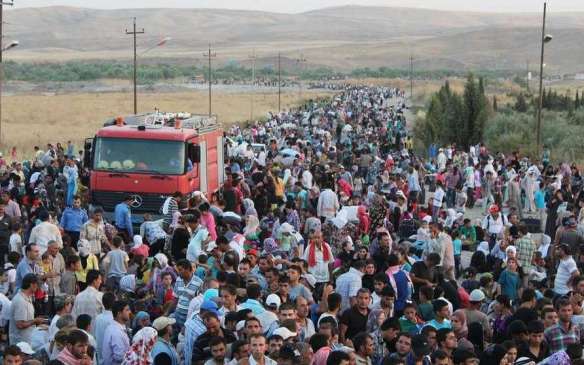Since the its official conception in 1993, the European Union has never faced an issue as divisive and all-consuming as the current refugee crisis rocking the whole of the continent. Already in 2015 alone, nearly 800,000 migrants have crossed into Europe seeking asylum, often losing their lives in an effort to find a better life. Attempts to help these refugees have already put a massive strain on Europe, both politically and socially, and threaten to undo much of the progress that the EU has brought to the continent.
Italy and Greece have been the main landing points for those fleeing chaos in Libya and Syria. Thousands arrive each day on each country’s shores, often smuggled into the country by cutthroat human traffickers, and continue their march toward their country of destination. Germany has been the goal of the majority of these migrants; the de facto leader of the EU has received far and away the most asylum requests so far.
At first, it seemed that European hospitality would win the day. German Chancellor Angela Merkel announced that her country would welcome the refugees with open arms, suspending the Dubling protocol that forced refugees to file for asylum in the first EU country they arrived in. French President Francois Hollande also extended a warm welcome to those fleeing the war-torn conditions of the Middle East and North Africa. The two leaders’ joint appearance before the European Parliament to discuss the topic was the first between the two countries since the fall of the Berlin Wall, and it seemed progress was near.
Instead, right-wing politicians have riled up an anti-immigrant fervor in Europe like never before, threatening to seriously damage much of the EU’s integration and unification.
The pressure to turn back the migrants came from Hungary, Serbia, and other eastern European countries. Those nations have little to no non-white, non-Christian populations and are determined to stay that way. Hungarian Prime Minister Victor Orban has been one of Merkel’s chief critics as well. He has proclaimed that Europe is in “deep trouble” and that “the Hungarian way of life is not a basic right of all people on Earth. It is a right only for people who have contributed to it.”
Shockingly, the Hungarians have even fenced off their border with Croatia to limit refugees’ access to the country. Croatia is a EU member, and thus the wall sets a deadly precedent; the EU prides itself on its Schengen agreement that abolished passport checks and created open borders between member states. The unity, symbolically and economically, behind Schengen and the introduction of the Euro currency are both under fire with this move, against which EU Council President Donald Tusk has spoken with the rallying cry, “We cannot give in to populism and xenophobia.” Despite this, many countries including Germany have temporarily suspended Schengen.
Following Orban’s dissent came increased resistance from within France and Germany themselves. Governor Horst Seehofer of Bavaria, a German state, accused Merkel of abandoning core German principles and abandoning the states by allowing refugees to flow into the country unchecked. Despite being a part of Merkel’s Christian Democrat coalition government, Seehofer’s harsh criticisms and threats of a lawsuit has seriously damaged Merkel’s plans for a welcoming Germany. The chancellor has instead been forced to track further and further to the right to please her growing populist constituents. She’s pushed deportation measures and new asylum laws through the Bundestag with great haste and vastly lessened Germany’s role in taking in new migrants.
A similar issue is rising in France. With elections looming, Marine Le Pen and her rebellious, right-wing National Front Party is making all the headlines with anti-Muslim and anti-immigrant rhetoric that has stunningly captured much of the country’s support. Though Hollande has continued trying to help the migrants flowing into Europe, the prospect of a National Front revolution remains in the background, shadowing his every pro-migrant decision.
This populist movement has been characterized by the mainly German group known as PEGIDA, an acronym which translates to “Patriotic Europeans Against the Islamization of the Occident”. The political group has become increasingly violent in their protests against opening up Europe to refugees and has spread especially in much of the Balkans, which today remains overwhelmingly white and Christian.
With those internal struggles occurring in the member states, the European Commission is at war with those countries to try to force a pro-European resolution to the issue. Though numerous summits and meetings are planned, little movement is really expected from leaders who hold such divisive views on how to deal with the incredible influx of refugees. Until they can come to a decision, humanitarian atrocities will continue as hundreds of thousands of Syrians and others risk their lives to reach European prosperity and leave their old, war-torn lives behind.
With the refugee crisis, financial disarray in Greece, talk of a potential “Brexit” as the UK debates whether or not to vote to stay in the EU in 2017, and more hammering away at European unity, it remains to be seen if this migrant crisis will be the one that breaks the monumental progress of the European Union. The EU has brought together 28 member states symbolically, economically, politically, and more, but all of that hinges now on if they can deal with a mass movement of refugees almost unrivaled in European history.


Pingback: Back from gone #3 Giving worries to God and believing in His promises | Belgian Biblestudents - Belgische Bijbelstudenten
Pingback: Back from gone #4 Your inner feelings and actions | Belgian Biblestudents - Belgische Bijbelstudenten
Pingback: Even in the so-called freeworld countries racism exist | From guestwriters
Pingback: Germany wanting to do something against racism – Some View on the World